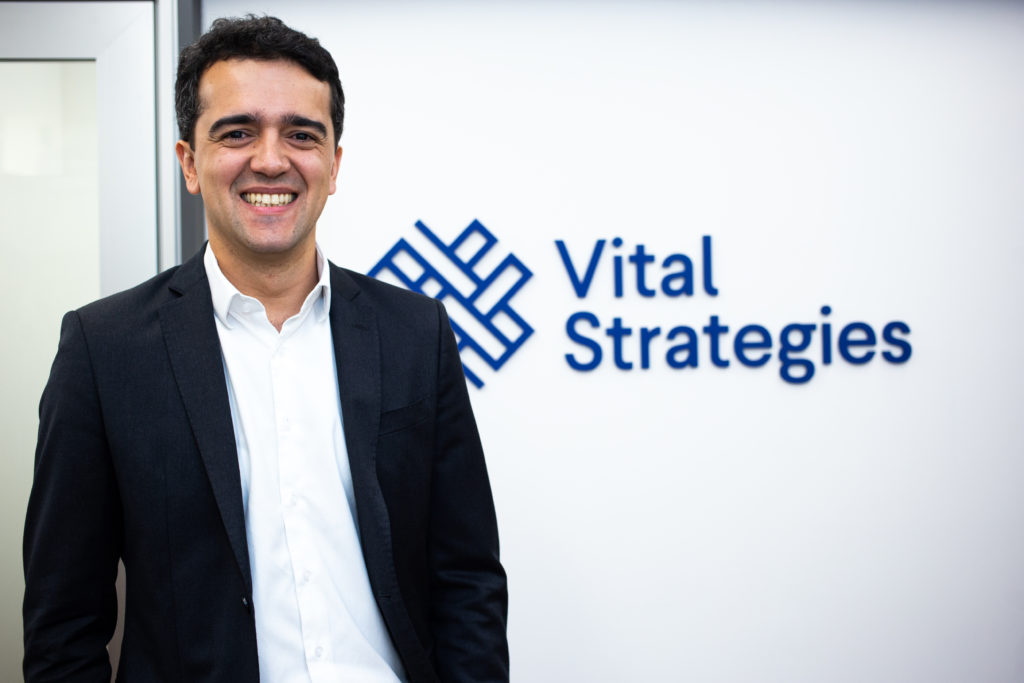
Pedro de Paula has led Vital Strategies’ Brazil office since its inception in 2017. As country director, he has played a vital role in establishing and growing the office, team and Vital Strategies’ breadth of work in the region.
Pedro first joined Vital Strategies in 2015 as embedded staff for the Bloomberg Philanthropies Initiative for Global Road Safety. Today, he serves as the executive coordinator for the initiative in São Paulo, where he worked with the city to develop a comprehensive road safety plan that will guide its actions in this area for the next decade.
Before joining Vital, Pedro practiced administrative and regulatory law, consulted on regulatory issues, and worked on research around urban policy. He received his law degree from the Federal University of Juiz de Fora, and later went on to earn his master’s in economic law and political economy from the University of São Paulo law school, where he is currently a Ph.D. candidate. In addition, he lectures on urban development and regulation for the law school graduate executive program at Fundação Getúlio Vargas.
We spoke with Pedro for a Q&A about his journey from law to public health, the important COVID-19 response work the team is undertaking in Brazil, and what he loves about living in São Paulo.
What brought you to the field of public health?
It was clear to me after graduating law school and practicing law that I wanted to work with policy to have as much impact as possible. It’s hard to beat public health in terms of impact. The policy topics that drive my interest are either directly or indirectly related to public health. I have a research background that focuses on urban policies, including mobility and transportation, which brought me to road safety and then further into the other areas that we work on.
It’s actually a curious thing because both of my parents are doctors, but I never thought about working as a health professional. As it turns out, I started out in the legal and social sciences and ended up in public health policy. Recently I was working on a proposal with Resolve to Save Lives around cardiovascular health and hypertension, which is what my dad studied and teaches. It’s a good coincidence.
What excites you the most about the work you do at Vital Strategies?
The ability to improve policy to better people’s lives, and to prevent injury and deaths. It’s also important to me that we do that with evidence-based practices. Everyone in Vital Strategies has a sense of urgency, which is something I share and that motivates me. There are plenty of things we need to change and improve in the world that just can’t wait any longer.
What are some new projects or initiatives at Vital Strategies Brazil?
Our COVID-19 response is something that we are really proud of. We are supporting the National Front of Mayors, a consortium of mayors from the 400 largest cities in Brazil, to develop materials for risk communication around COVID-19. These cities represent over 60% of Brazil’s population and 70% of its GDP. We are working with the Ministry of Health and civil registration entities to enhance databases and develop datasets to measure excess mortality due to COVID-19, to determine the toll of the pandemic in Brazil. This work was recently published by a consortium of state department of health commissioners in an interactive dashboard.
We are also working with two states, Maranhão and Ceará, and two cities, Goiânia and Aracaju, to develop their COVID-19 alert-level systems.
Our office culture here in Brazil is also worth mentioning; our staff truly embody Vital Strategies’ values and spirit. We were able to create an environment that resembles the New York office, but that has local characteristics and feeling. We are also working on bringing locally conceived, designed and funded projects to fruition in the next year.

4. Where do you live and what do you enjoy most about it?
I live in São Paulo, the largest city in Brazil. I was born here because this is where my parents did their residencies after medical school, but I was raised in Minas Gerais, another nearby state. I identify myself more as being from Minas Gerais, but I’ve always loved São Paulo. It’s a megacity and with that comes a lot of inequality, but also a lot of things to learn and problems to solve. It’s very urban, so you can walk or use public transportation. There is a lot of knowledge in the city; some of the main universities in the country are here, and I was lucky enough to pursue my master’s and Ph.D in one of them and teach in another. It’s also a city with a lot of immigrants, so there is a lot of cultural diversity.
5. Who or what inspires you?
What inspires me is change. It is important that people who are privileged—who have access to education, communication channels and to decision-makers—use that privilege to make positive change and create a more just society. That’s what drives and motivates me.
6. What advice would you give to those interested in entering the public health field?
Look closely for inequities and the outcomes and effects of those inequities. Data is a key component of that. If you are in a different field and you want to work in public health, understanding data and how to use it to inform judgements and activities is key. It is also important to understand the interconnectedness of fields and policies, for example, how budgetary issues, food policy and urban mobility or street design all impact health. There are many ways in which people who do not have a formal background in public health can join the field and help us.